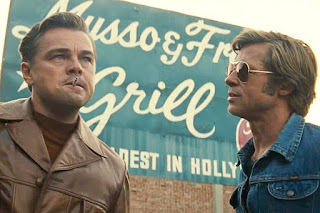When director Quentin Tarantino announced his ninth film would take place in Hollywood in 1969, it was a given that I would be excited to see the movie. As his PR machine deftly released casting notices, and lurid plot points (Would it or would it not be about the Manson killings- wait, Margot Robbie is playing Sharon Tate- it must be!) I prepared myself to manage my expectations so I wouldn't go in wanting more than Tarantino could give me. I'm happy to report Once Upon a Time in Hollywood (2019) delivers on some of my highest hopes.
Tate is Dalton's neighbor and acts as the propellant for the unavoidable ending- a sort of blond tracking shot that leads Dalton and Booth to the historic events on Cielo Drive on August 8, 1969.
Cool Hollywood cameos are in abundance: Steve McQueen (Damian Lewis), Bruce Lee (hilariously pompous Mike Moh), Mama Cass (Rachel Redleaf), George Spahn (Bruce Dern still giving us acting realness at age 83), and the cast of infamous "hippies" that inhabited the Spahn Ranch.
Tarantino has a field day showing us that no one knows more about this time period than he does. But wisely, these gorgeous details are kept as elements of the setting- like a trippy kaleidoscope that his leads walk through as they navigate their show business destinies.
As Booth, Dalton, and Tate cross paths the tension of what must happen provides enervating fuel, raising the stakes of this oft-told story of unfulfilled and empty Hollywood lives. It's like the first gut-knot inducing scene of Inglorious Basterds (2009) stretched out over a whole, swinging movie.
I also have to give Tarantino credit for giving Brad Pitt a role that fits him like a torn and used glove. Pitt is perfection as a Lebowski-level cool guy who is nonetheless aware that he's a hanger-on. While he isn't really sure what he should be doing- he knows he's wasting himself. Pitt's screen charm is electric and so casual, it's hard to tell he's acting at all. I suspect with the success of this film, Pitt can look for an Oscar nom come next year.
Is the film too long? Yes. Are there long stretches where actors play actors acting? Yes. But the ending of this film is as satisfying as anything I've seen recently. Tarantino believes that movies can redeem and save us. Once graphically illustrates that belief.













